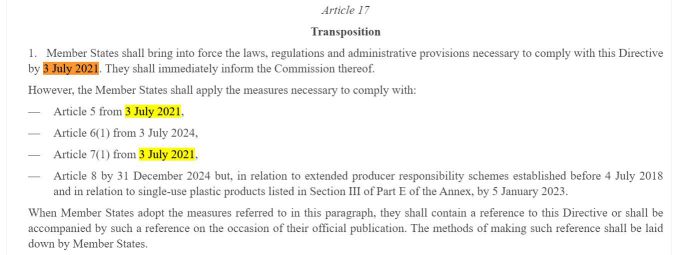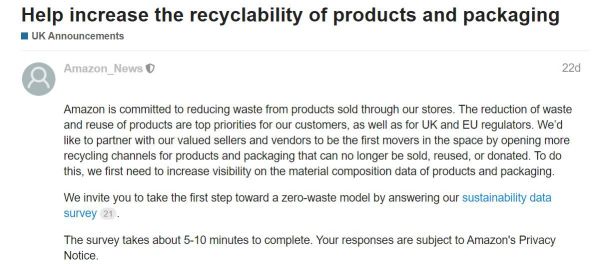One month ago, the largest EU e-commerce platform Amazon issued an announcement on “helping to improve the recyclability of products and packaging”. Intending to reduce product waste and usage is the top priority of the UK and EU regulatory agencies, hoping to reduce product packaging and recycling to expand more recycling channels.
In July of this year, the European Union’s administrative regulation of banning the use of single-use plastic products came into effect.
From the effective date of the ban, the member states of the European Union shall pass domestic regulations no later than two years to ensure that the ban is implemented in their own countries.
After the implementation of the ban, plastic straws, tableware, cotton swabs, dishes, stirrers and balloon sticks, and polystyrene food packaging bags have all been blacklisted. In addition, all kinds of oxidatively degradable plastic bags are also banned.



E-commerce platform sellers cannot stay out of the ban on plastics
According to statistics, the largest e-commerce platform in the EU Amazon alone generated 465 million pounds of plastic packaging waste in 2019, and this waste is “mainly used in landfills, not for recycling, but for landfills “. According to a new study by Oceana, a marine conservation advocacy organization, the retailer’s plastic waste production is “astounding and growing at an alarming rate.” In addition, 7 billion wrapped air pillows, bubble films and other plastic packaging were produced in 2019. The waste generated by plastic air pillows alone is enough to circle the earth 500 times. Oceana estimates that 22.44 million pounds of plastic packaging waste entered the global freshwater and marine ecosystems in 2019, equivalent to the value of a delivery truck every 70 minutes.
Matt Littlejohn, Senior Vice President of Oceana, said, “It’s time for e-commerce platforms to listen to their customers. According to recent surveys, they want plastic-free alternatives and are deeply committed to reducing their plastic footprint.”
In fact, cross-border e-commerce platforms have taken action to fulfill their social responsibilities.

One month ago, the e-commerce platform Amazon issued an announcement “helping to improve the recyclability of products and packaging”. Intending to reduce product waste and utilization is the top priority of the UK and EU regulatory agencies, hoping to reduce product packaging and recycling to open more recycling channels.
Large global companies have been practicing, and the pursuit of “sustainable packaging” has never stopped and will be the trend. In the context of the rapid development of e-commerce logistics, major e-commerce platforms have responded and launched green parcel solutions.
German packaging law
In addition, EU countries are extremely strict on packaging and recycling. German packaging law is an unavoidable issue in Germany.
The new German packaging law is a mandatory law that has come into effect on January 1, 2019. It is mandatory that all products sold contain packaging, including external packaging, shipping packaging materials, etc., which require registration and licenses and require sellers to declare packaging materials, type, and weight for sold products. All sellers are required to comply with the new packaging law, otherwise, the products will not be stored or sold in Germany.
According to the requirements of the new German environmental protection law, as long as the seller serves consumers in Germany, any packaging of your products must be registered and licensed. Otherwise, for non-compliance, a fine of up to 200,000 Euros, prohibition of sales, and written warnings may be imposed.
How to register for German packaging law?
1. The name and address of the company
2. Tax number of Germany or other EU countries
3. The company’s phone number, fax number, and email address
4. Information of legal person/person in charge
5. Business license
How to use the registered German packaging law code?
After registration, you will receive a packaging law registration code. Within 7 to 10 days after the registration code is issued, the total package weight accumulated in the next year should be declared to the German official; then, the packaging recycling icon should be printed or affixed on the package.
Conclusion and compliance advices
With the introduction of the EU’s plastic ban, the EU will gradually de-plasticize. For sellers, it is necessary not only to adjust the direction of product selection but also to pay attention to the fact that the EU’s long-distance trade and mail order leading to more and more product packaging waste worldwide.
For sellers selling goods on German e-commerce platforms, it will be an additional challenge if they want to sell goods in Germany in compliance. Because not only manufacturers are responsible for using environmentally friendly packaging, but also importers, distributors, retailers, online sellers, etc. must also comply with this regulation and register on relevant German websites as required by law.
If you want to know more about the German packaging law and compliance issue, feel free to contact us for a non-binding consultancy.
EU-REP-Service work with reliable German packaging register authorized system operator together to facilitate the German packaging compliance for non-EU manufacturers and distributors such as Amazon and Ebay sellers. Our price for German packaging registration and system recycling fee is very transparent and competitive in the market. If you want to know more about the latest policy information, cost, and procedure about the new German packaging law, welcome to contact us for consultation and quote estimate.
EU-REP-Service.de